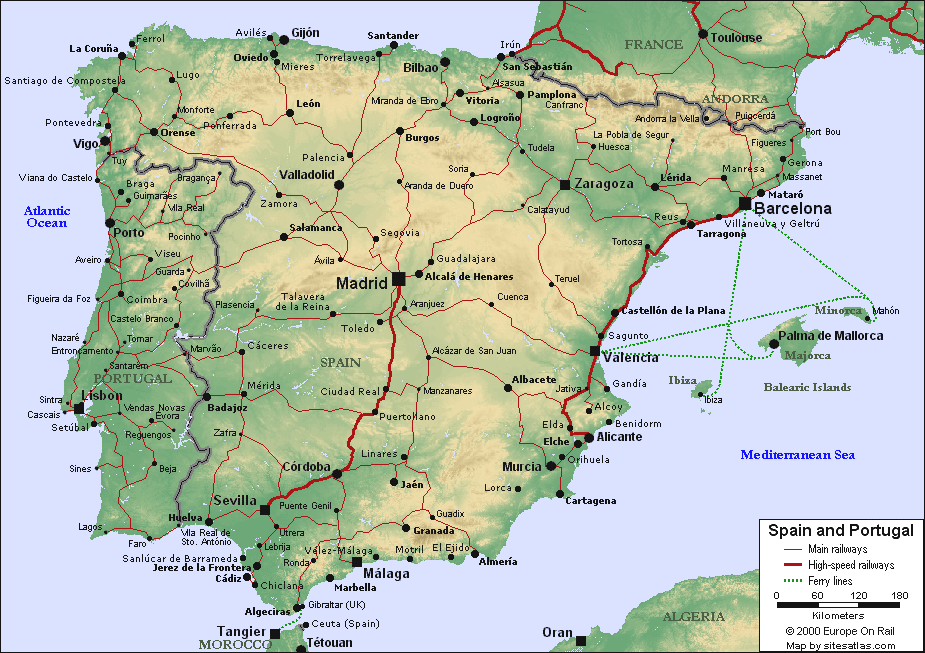Week 1
Spain has an advantage within the history of the European community of having a national and geographical unit that match almost perfectly. The one little piece that has drifted in and out of the Iberian unity is Portugal. The Celts came all the way to the Atlantic in the pre-Roman period. The Romans discovered and colonized Iberia in the third century BC and turned Iberian/HIspania into the most profitable of all the Roman colonies. During Fall Quarter, we will study Celtic, Roman and Visigothic Spain. The Islamic invasion of Spain from the North African coast in 711 sets the stage for our Winter Quarter: Muslims in Spain, Jews in Spain and the Reconquista: Christians taking back Spain. Spring Quarter is devoted to Renaissance Spain (Ferdinand and Isabella) and the early modern period. The Greeks called the peninsula Iberia. At that time the name did not describe a single political entity or a distinct population of people. Strabo's Iberia was delineated from Keltikē by the Pyrenees and included the entire land mass south-west (he named it "west") of there. The Ancient Greeks discovered Iberia by voyaging westward. Hecataeus of Miletus was the first known to use the term around 500 BC. Herodotus of Halicarnassus says of the Phocaeans that "it was they who made the Greeks acquainted with Iberia." The Roman historian Polybius identifies Iberia as the Mediterranean side as far south as Gibraltar, with the Atlantic side having no name. Elsewhere he says that Saguntum is "on the seaward foot of the range of hills connecting Iberia and Celtiberia." Strabo refers to the Carretanians as people "of the Iberian stock" living in the Pyrenees, who are to be distinguished from either Celts or Celtiberians. When the Romans encountered the Greek geographers they used Iberia poetically and spoke of the Iberi, the population of Iberia. First mention was in 200 BC by the poet Quintus Ennius. The Romans had already had independent experience with the peoples on the peninsula during the long conflict with Carthage. The Roman geographers and other prose writers from the time of the late Roman Republic called the entire peninsula Hispania. As they became politically interested in the former territories of Carthage the Romans came to use Hispania Citerior and Hispania Ulterior for "near" and "far Spain". Even at that time large sections of it were Lusitania (Portugal south of Douro river and Extremadura in western Spain), Gallaecia (Northern Portugal and Galicia in Spain), Celtiberia (central Spain), Baetica (Andalusia), Cantabria (northwest Spain) and the Vascones (Basques). Strabo says that the Romans use Hispania and Iberia synonymously, and distance them as near and far. He was living in a time when the peninsula was divided into Roman provinces, some belonging "to the people and the Senate" and some to "the Roman emperor." Baetia was distinguished by being the only one belonging "to the people." Whatever language may have been spoken on the peninsula soon gave way to Latin, except for Basque, protected by the Pyrenees."
REQUIRED READING
About the reading. We have an excellent one volume simple history of Spain from beginning to the present. The Mark Williams book is exactly what we search for here at the Institute: reasonable price, good clear printing. But unfortunately it is now out of print so we all need to search around and get ourselves a good used copy OR settle for Kindle version. I just checked and there are a number on amazon used at reasonable prices. Also we have about 5 copies at the Institute bookstore so if you want to stop by during the daytime, just call our office at 408 864 4060 ask them if they are open and whether there are still Mark Williams books in bookshop.

Mark Williams,
The Story of Spain: The Dramatic History of Europe's Most Fascinating Country,
Golden Era Books,
ISBN 0970696930
GREAT CITIES OF SPAIN
During our year together studying the history of Spain, we will visit various cities of Spain during part two of some of our evenings. Here is a list of the cities that we will visit.
FALL:
Week 2, Malaga
Week 3, Cartagena
Week 4, Taragona
Week 5, Mérida
Week 6, Jaén
Week 7, Sevilla
Week 9, Santiago de Compostella
WINTER:
Week 11, Córdoba
Week 12, Jerez de la Frontera, Andalusia
Week 14, Burgos
Week 15, Toledo
Week 17, Doñana National Park
Week 18, Huelva
Week 19, Leon
SPRING:
Week 21, Valladolid
Week 22, Segovia
Week 23, Zaragoza
Week 24, Ávila
Week 26, Granada
Week 29, El Escorial
